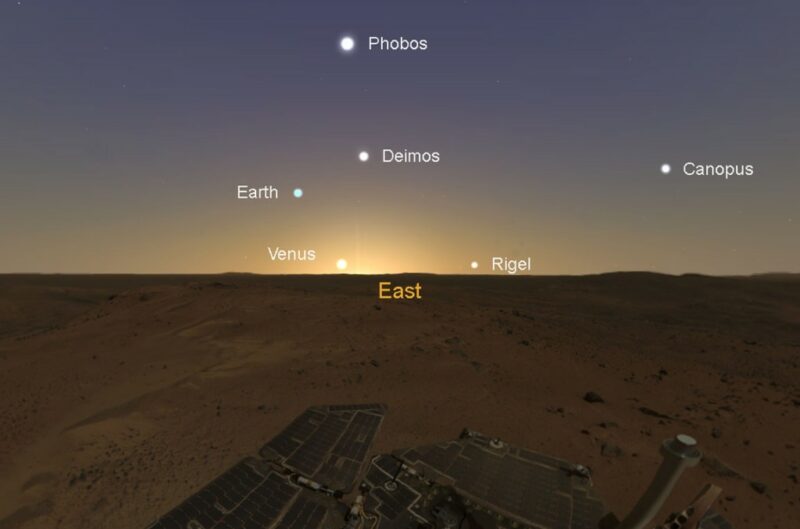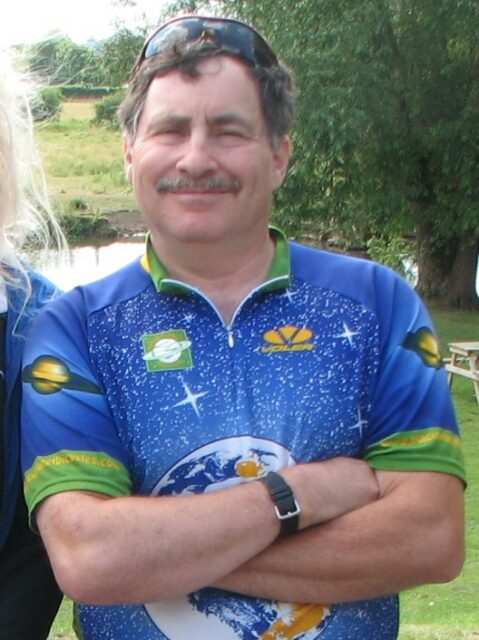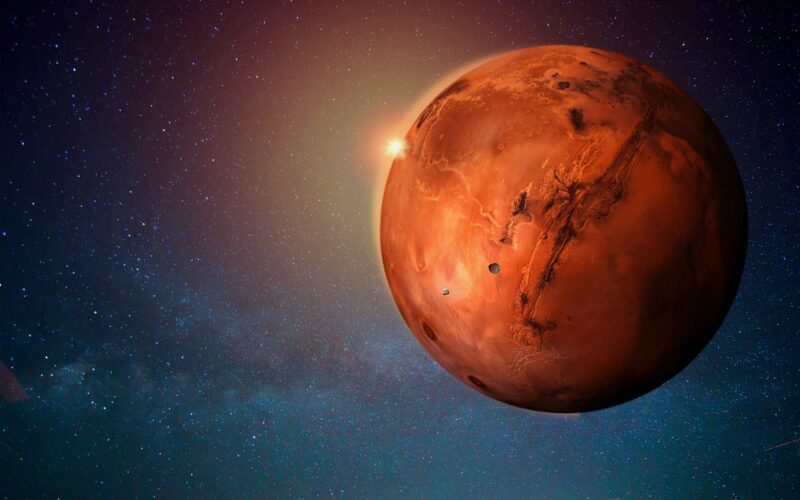Life on Mars statistically probable according to Richard Soare’s research
Is there life on Mars? That question is propelling the mission of the Perseverance rover, which landed on the Red Planet Feb. 18. It has also driven the research of Dawson College Geography teacher and Mars researcher Richard Soare for over two decades.
Specifically, Richard’s research has focused on finding evidence of near-surface ice in the non-polar regions of Mars.

Photo: A Mars view of the Earth. Courtesy of NASA.
Recent “icy” findings
In January, an international team of planetary scientists led by Richard and comprised of members from the United States, France, Great Britain, Ireland and Canada, published a high-impact article showing that very near-surface ice is present today at the northern mid-latitudes.
“The statistical approach that was used for the first time could be extremely useful in identifying other areas where very near-surface water ice could be present,” Richard said. “NASA believes that where there is water, or water ice, habitability may also be in the geological record.”
Richard has published over 150 peer-reviewed articles, books, encyclopaedia entries and extended abstracts on Mars.
Last week, Richard was interviewed by CTV News, CJAD and Dawson’s Communications Office.
Q and A with Dawson’s Richard Soare

Why are you so intrigued by the Red Planet?
Richard: On a warm breezy summer’s day on Mars, at or near the mid-latitudes, a Dawson College student could amble about quite happily in flip-flops and a T-shirt. Despite the ambient temps, absent oxygen would engender asphyxiation, low air-pressure would result in boiling blood and, unless protected by a sunscreen (SPF 10,000), UV rays and cosmic rays would destabilise DNA, affect deep epidermal burns, cause blindness and, in general, not leave one in tip-top shape.
On the other hand, environmental conditions at the surface of Mars were much more Earth-like than today early on in its history, with flowing water, hemispheric oceans and seasonal variances of weather that perhaps would not be out of place in today’s high arctic in Canada.
The possibility of Mars having been a cold sister to Earth drives much of the Red Planet’s exploration.
What is the significance of this Mars mission of the Perseverance rover? Why is it important?
Richard: The Jezero impact crater is ancient, almost 4 billion years old. Its rim is dissected by a channel that is thought to have discharged fluvial sediments deltaically on the crater floor. With stable water at the surface, a dense atmosphere protecting all that lies below it from harmful radiation, and intermittently-clement temperatures, early Mars might have followed an evolutionary path not far from that of the Earth. Traces of organic molecules or, possibly but not probably, fossilised evidence of simple single-celled organismal life could be embedded in Jezero’s deltaic sediments.
What an exciting day it would be for humanity were Perseverance to discover that the Earth is not unique, biologically speaking.
What drives your quest for knowledge and learning?
Richard: Mars is an undiscovered country. It comprises a surface area equal to all of the Earth’s non-oceanic land but pristine and largely unaffected by our human peccadillos. What a wonderful place to explore physically, philosophically and, to the extent that what we learn about the Red Planet reveals as much about us as it does that alien environment, psychologically.
What research are you most proud of and why?
Richard: The focal point of my research is investigating the extent to which the freeze-thaw cycling of water has impacted and revised Mars’ surface from the relatively recent past to ancient times. The research has been published in leading planetary-science journals such as Icarus and Earth and Planetary Science Letters as well as in countless extended abstracts. I was the lead editor and a contributor to two recently published books: “Dynamic Mars: recent and current landscape evolution of the Red Planet” (2018) and “Mars’ Geological Enigmas: from the Late Noachian Epoch to the present day” (2021). A third book is in the early stages of preparation: “Ice is nice: a volatile journey from the inner to the outer solar system and beyond” (2023). I have served on numerous review committees for NASA and have also been the lead organiser of two planetary science workshops funded by NASA. Hopefully, the future will be as full of opportunity for me as the past.
What advice do you have for young people interested in doing the kind of research you are doing?
Richard: Science, I mean the universe, has no limits or constraints on the power of thought. As a philosopher cum planetary scientist, I have experienced the wonders of discovery and the fulfilment of seeing things that no one else has. There is no reason to believe that I am at all special, no more no less so than any of my teaching colleagues at Dawson, any of my students or even the larger student body at the college.
The next time that the moon is high in the sky and the stars are shining brightly upon you, wonder why and……………!!
Brief bio
Dr. Richard Soare is a physical geographer specializing in periglacial (cold-climate, non-glacial) landscapes. He has spent considerable time exploring the Canadian arctic looking for possible insight on similar landscapes on Mars. His work spans Mars geographically, ranging from the plains of Utopia Planitia in the northern hemisphere and the Moreux impact-crater at the Mars dichotomy through to the Argyre impact-crater in the southern hemisphere. Recently, he was the lead editor of the book “Dynamic Mars: Recent and Current Landscape Evolution on the Red Planet” (2018) and a similarly titled special issue of Icarus. He is also the lead editor of “Mars Geological Enigmas, from the late Noachian Epoch to the present day” (coming out in May 2021). A third book, “Ice is nice: the story of ice from the inner to the outer solar system”, is in the early stages of planning and on track to be published in 2023.
Richard was educated at Balliol College, Oxford (D. Phil, Political Philosophy) and he has multiple degrees from McGill University (MSc, Physical Geography; BA/BSc, Geography/Biology; MA, Political Science; BA, Honours Philosophy). He also spent two years doing post-doctoral work at McGill’s Redpath Museum.
Links:
Richard Soare’s profile on Researchgate:
https://www.researchgate.net/profile/Richard_Soare
Jan. 13, 2021 publicity release from the French National Science Institute (CNRS):
https://www.insu.cnrs.fr/fr/cnrsinfo/des-polygones-coins-de-glace-observes-sur-mars
Richard’s last book:
https://www.amazon.com/Dynamic-Mars-Current-Landscape-Evolution/dp/0128130180
Richard’ upcoming book:
https://www.elsevier.com/books/mars-geological-enigmas/soare/978-0-12-820245-6
Richard’s interview on CTV Feb. 18:



